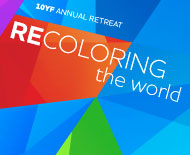Future Now
The IFTF Blog
From #10YF2014: The National Sharing Economy
 Over the past decade, collaboration and sharing have emerged as powerful core strategies to unlock the value of underused goods and services in sectors as diverse as real estate and transportation, fashion and farming. Underlying all these innovative strategies are new flows of information—flows that translate trust, access, and convenience into economic value. As entrepreneurs look for ways to capture this value in new products and services, local policymakers are grappling with implications for existing economic structures and proprietary interests, often stumbling over legacy barriers to adoption. A bold experiment in Ecuador, however, has explored the potential for a national sharing economy.
Over the past decade, collaboration and sharing have emerged as powerful core strategies to unlock the value of underused goods and services in sectors as diverse as real estate and transportation, fashion and farming. Underlying all these innovative strategies are new flows of information—flows that translate trust, access, and convenience into economic value. As entrepreneurs look for ways to capture this value in new products and services, local policymakers are grappling with implications for existing economic structures and proprietary interests, often stumbling over legacy barriers to adoption. A bold experiment in Ecuador, however, has explored the potential for a national sharing economy.
The 2014 Ten-Year Forecast Annual Retreat explored the landscape of change over the next decade by inviting attendees to contemplate ten projects that—if successfully undertaken today—could change the paradigm in their fields in the next ten years. These bold projects are already taking shape in the dark underside of the internet, in the foundations of our global cities, in the building blocks of our economies, and in the microbes of our bodies and our planet. They are rapidly recoloring our world.
During the retreat on May 1-2, David Evan Harris examined the Ecuadoran experiment which is essentially asking whether it’s possible to scale the sharing economy to a national economic policy as an alternative path to development.
Ecuador recently played host to the Free Libre Open Knowledge (FLOK) Society project, an international research collaboration over the past year that involved visiting scholars from around the world, including the likes of Michel Bauwens, John Restakis, and Daniel Araya, and engaged communities in a broad and ambitious exercise in exploring how to implement free and open systems of knowledge in the widest possible way. Though the government of Ecuador has yet to implement these measures, the results of the research and convenings are available in English and Spanish on the FLOK project’s Buen Conocer website.
The FLOK project offers a valuable counterpoint to recent critiques of the sharing economy evolving in the US with platforms like Airbnb and Lyft. Susie Cagle’s illustrated “Case Against Sharing” article makes the critique simply and elegantly in a series of cartoons. What remains to be seen is whether a sharing economy driven by public policies developed with public participation could ameliorate the concerns of critics like Cagle and bring about a more sophisticated and valuable national and even global movement toward sharing of goods and ideas.
This post is from our 2014 Ten-Year Forecast, which explores 10 bold projects that have the potential to change the world over the next 10 years. In the coming weeks, look for more about the projects and the futures they would make.
Curious about the Ten-Year Forecast Program?
- Follow the projects at @iftf, #10YF2014, and #10projects10years
- Take a sneak peek at our plans for 2015
- Find out more about the Ten-Year Forecast program
- Check out previous years' Ten-Year Forecast research
- Contact Sean Ness (sness@iftf.org)



